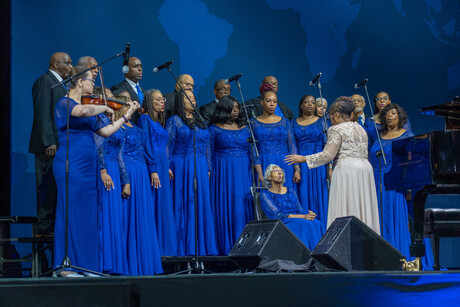Ellen White wrote, “Love cannot be commanded; it cannot be won by force or authority. Only by love is love awakened.”[1]
Have you ever heard the saying, “The Bible says it, I believe it, that settles it?” While this may sound pious, reading the Bible in this way is dangerous. Biblical literalism can lead to people defending slavery, eternal torment and misogyny in God’s name.
The inability to interpret the context and trajectory of scripture can do a lot of harm. If we can’t read between the lines, people may end up as the collateral damage to our bad theology. We may think that our race, gender or religion entitles us to treat other people like dogs.
The highest view of the Bible doesn't support proof text literalism. It takes the whole story and seeks to understand it in context. A perfect example is when Jesus spoke to a Canaanite woman in the Gospel of Matthew.
Read literally, Jesus was racist and misogynistic, someone who referred to a lady as a "dog." Reading between the lines, Jesus was a liberator who confronted the disciples' racism while honoring the dignity and faith of this daughter of God.
I believe the best way to understand this passage is through verbal irony. Jesus was using the prejudice against women and Canaanites as a teaching opportunity.[2] He used language His disciples were familiar with; they took Him literally and wanted to send this Canaanite “dog” away. But she read between the lines and received mercy. Picking up on His nonverbal cues, she had the audacity to "disagree" with Jesus, and that was exactly what she was supposed to do. He told her mercy was not intended for people like her. She told Him, "Yes, it is!"
She read between the lines and saw love. The disciples heard the literal words but missed the meaning. With that context in mind, read Matthew 15:22–28 through the eyes of this Canaanite woman:
"A Canaanite woman from that vicinity came to him, crying out, “Lord, Son of David, have mercy on me! My daughter is demon-possessed and suffering terribly.” Jesus did not answer a word. So, his disciples came to Him and urged Him, “Send her away, for she keeps crying out after us.”
He answered, “I was sent only to the lost sheep of Israel.”
The woman came and knelt before Him. “Lord, help me!” she said. He replied, “It is not right to take the children’s bread and toss it to the dogs.”
“Yes it is, Lord,” she said. “Even the dogs eat the crumbs that fall from their master’s table.”
Then Jesus said to her, “Woman, you have great faith! Your request is granted.” And her daughter was healed at that moment."
It's telling, that 2,000 years removed from this story, there are many men who still view women as “dogs.” In the name of headship theology, they enable systemic abuse to run rampant. They see women as dogs and tell them to “Go home!”[3]. They read the Bible literally but miss the larger meaning. They tell women to, "be silent"[4], they do not "permit women to have authority over a man,"[5], all the while sweeping the abuse by men in authority under the rug.
Is it any wonder that a theology of male headship alongside a belief in eternal torment has caused so much harm? If God is willing to burn people in hell who won't submit, then why wouldn't an abusive husband see his wife's unwillingness to submit as rebellion?
Churches that teach male headship say they are against abuse. But the theological underpinnings of eternal torment, male headship and Biblical literalism provide the moral cement that enables abuse to flourish.
Churches that preach male headship send the message that protecting this theology is more important than protecting the people who have been harmed by the abuse. Unbalanced people will take the message of submission to an extreme. This has always been the case.
Southern theologians argued that enslaved people should submit to their masters. They argued for benevolent slavery, rationalizing that masters should treat their slaves in a "Christlike" way.
Similarly, those who believe wives should submit to their husbands believe in benevolent headship.
Such theology is fraudulent.
Christ said, “By their fruits you shall know them.”[6] The theology of headship has produced a lot of bad fruit. If the fruit is bad, cut down the tree. It’s time we read between the lines. Christ alone is head of the church. Lording authority over others is not the methodology of Christ[7]. Go be free! Love cannot be commanded; it cannot be won by force or authority. Only by love is love awakened.
[1] White, E. G. (2022). Reflecting Christ. Review & Herald Publishing.
[2] See Jane Elliot’s, “Blue-Eye Brown-Eye Test” as an example of using irony to make a profound point against prejudice: exploringyourmind.com/blue-eyes-and-brown-eyes-the-jane-elliott-experiment/
[3] In 2019 John MacArthur spoke about biblical authority and how women preachers like Beth More should “Go Home!” religionnews.com/2019/10/19/accusing-sbc-of-caving-john-macarthur-says-beth-moore-should-go-home/
[4] For a thoughtful way to understand the 1st Corinthians 14:34–35 passage that tells women to “be silent,” see Beth Allison Barr’s explanation: facebook.com/search/posts/?q=be%20silent
[5] On the statement from 1 Timothy 2:12 about authority see Cindy Westfall’s explanation: facebook.com/search/posts?q=authority&filters=eyJycF9hdXRob3I6MCI6IntcIm5hbWVcIjpcImF1dGhvcl9tZVwiLFwiYXJnc1wiOlwiXCJ9In0%3D
[6] Matthew 7:20
[7] Matthew 20:24–26









